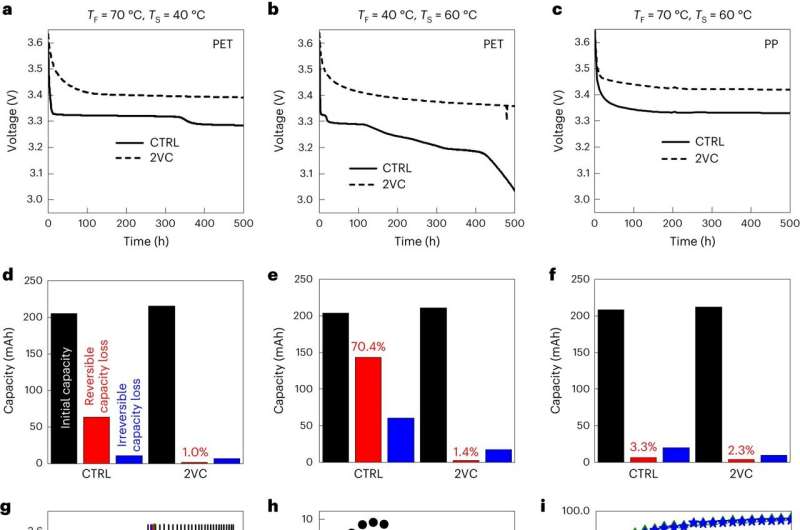September 29, 2023 report
This article has been reviewed according to Science X's editorial process and policies. Editors have highlighted the following attributes while ensuring the content's credibility:
fact-checked
peer-reviewed publication
trusted source
proofread
Replacing tape used to make lithium-ion batteries could slow battery degradation and reduce self-discharge

A team of chemists and physicists at Dalhousie University in Canada has found that replacing the type of tape used to make lithium-ion batteries could slow battery degradation and reduce the amount of self-discharge in smartphones and other personal devices. In their project, reported in the journal Nature Materials, the group studied the behavior over time of polyethylene terephthalate (PET) tape used to make lithium-ion batteries in smartphones.
Personal device makers and owners alike know that there is one feature of such devices both would like to improve—battery performance and lifespan. Lithium-ion batteries in devices such as smartphones only last a few years. They also self-discharge, losing charge even when they are not being used. In this new effort, the research team wondered about the impact of using PET tape in batteries.
To find out, they studied characteristics of the tape over long periods of time in smartphones. They found that the tape was not chemically stable—it tended to depolymerize, which led to reductions in performance. This had a negative impact on both battery longevity and self-discharge. The team then looked for a suitable replacement and found that polypropylene (PP) tape worked just as well as PET tape in lithium-ion batteries and does not depolymerize.
The researchers found that using PP tape instead of PET tape made lithium-ion batteries last approximately 10% longer. They also found that using PP tape reduced self-discharge by approximately 70%. In the real world, that would mean phones would lose little of their charge when inactive for long periods of time.
The research team also noted that switching from PET to PP tape likely would not change the cost of devices using lithium-ion batteries. They acknowledge, however, that further testing is required to make sure PP tape works as well at PET tape and that it holds up to use in other ways before it could be used in new devices.
More information: Anu Adamson et al, Improving lithium-ion cells by replacing polyethylene terephthalate jellyroll tape, Nature Materials (2023). DOI: 10.1038/s41563-023-01673-3
© 2023 Science X Network
















